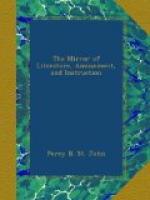ago, before the potato was introduced into their gardens,
agues had been so exceedingly prevalent, that the
periods in which they, or their families, had been
afflicted with that disorder, were the eras to which
I usually heard them refer in speaking of past events;
and I recollect being cautioned by them frequently
not to stand exposed to the sun in May, lest I should
get an ague. The potato was then cultivated in
small quantities in the gardens of gentlemen, but it
was not thought to afford wholesome nutriment, and
was supposed by many to possess deleterious qualities.
The prejudice of all parties, however, disappeared
so rapidly, that within ten years the potato had almost
wholly driven the cabbage from the gardens of the cottagers.
Within the same period, ague, the previously prevalent
disease of the country, disappeared; and no other
species of disease became prevalent. I adduce
this fact, as evidence only, that the introduction
of the potato was not injurious to the health of the
peasantry at that period; but whether its production
was, or was not, instrumental in causing the disappearance
of ague, I will not venture to give an opinion.
I am, however, confident, that neither draining the
soil (for that was not done,) nor any change in the
general habits of the peasantry, had taken place,
to which their improved health could be attributed.
Bread is well known to constitute the chief food of
the French peasantry. They are a very temperate
race of men; and they possess the advantages of a
very fine and dry climate. Yet the duration of
life amongst them is very short, scarcely exceeding
two thirds of the average duration of life in England;
and in some districts much less. Dr. Hawkins,
in his Medical Statistics, states, upon the
authority of M. Villerme that, in the department of
Indre, ’one fourth of the children born die
within the first year, and half between fifteen and
twenty; and that three fourths are dead within the
space of fifty years. Having inquired of a very
eminent French physiologist, M. Dutrochet, who is
resident in the department of Indre, the cause of
this extraordinary mortality, he stated it to he their
food, which consisted chiefly of bread; and of which
he calculated every adult peasant to eat two pounds
a day. And he added, without having received
any leading question from me, of in any degree knowing
my opinion upon the subject, that if the peasantry
of his country would substitute (which they could
do) a small quantity of animal food, with potatoes,
instead of so much bread, they would live much longer,
and with much better health. I am inclined to
pay much deference to M. Dutrochet’s opinion;
for he combines the advantages of a regular medical
education with great acuteness of mind, and I believe
him to be as well acquainted with the general laws
of organic life as any person living: and I think
his opinion deserves some support, from the well known
fact, that the duration of human life has been much




